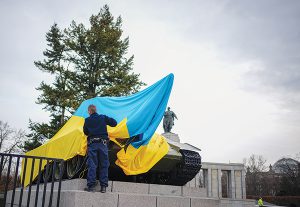Amid the carnage of war in Ukraine, one man appears to feel grimly vindicated, if not quite happy about how things have turned out — the man who played an outsize role in starting the conflict in 2014, Igor Girkin, also known as Strelkov.
Few people are hated as much in Ukraine as Strelkov (I’ll use his nom-de-guerre throughout, since he prefers it to his real name). In April 2014, after Ukraine’s provisional government said it would send troops to put down pro-Russian revolts in eastern Ukraine, Strelkov crossed the border from Russia with about 50 men and wreaked enough havoc to pull the Russian military into a conflict that Vladimir Putin initially was reluctant to enter. He almost got Putin to do in 2014 what he is doing now, but Strelkov received no thanks from the Kremlin, was marginalised and became — so it seemed — little more than a bitter fringe figure.
The conventional wisdom saw Putin as a wily, modern strongman more interested in self-preservation and the enrichment of his clique than in any kind of ideology. By contrast, Strelkov was a romantic believer in a version of the Russian Empire that has never really existed outside of nostalgic pseudo-historical literature. Putin pursued a bureaucratic, then a political, career and consolidated power while Strelkov reconstructed historical battles as a hobby and fought as a volunteer in Transnistria and the former Yugoslavia.
And yet in 2022, Putin is so besotted with history that he can talk of little else; to a large extent, he’s come around to Strelkov’s worldview, ditching his cynicism and pragmatism for a kind of murderous idealism.
Indeed, Putin appears to be past caring about the open economy he maintained for the first 21 years of his rule. He certainly cares little about the fortunes of the wealthiest Russians, or about the effect of unprecedented Western sanctions on everyone in Russia, from his closest friends to millions of ordinary workers. He’s no longer listening to “systemic liberals†around him, the architects of Russia’s relative oil-fuelled prosperity that underpinned Putin’s popular support.
The recent headlong emigration of a key “syslib,†Anatoly Chubais, a man to whom Putin in large part owes his rise, is a sign that this group no longer has a place in Putin’s system of power.
This metamorphosis makes Strelkov’s utterances a rare window on what Putin might do next as he continues his spiritual and intellectual journey toward the loony edge Strelkov has always inhabited — a journey that ends when the two become indistinguishable.
When Strelkov’s tiny group of fighters, funded apparently by the wealthy
nationalist Konstantin Malofeev, took control of the Ukrainian town of Slavyansk in 2014, it became a magnet for local separatists, like-minded Russian volunteers and out-of-uniform soldiers acting as mercenaries. Strelkov quickly rose to “defense minister†of the self-proclaimed Donetsk People’s Republic, commanding a substantial ragtag force. As the regular Ukrainian army caught its stride and pushed back against Strelkov’s fighters, the Russian resorted to the tactic that serves the Ukrainians well in the current conflict: He led the rebel army into the city of Donetsk, where street-by-street urban combat would have been too costly for the Ukrainians. Then Putin reluctantly sent Russian troops to support the separatists — their defeat would have undermined the popular euphoria that gave him his best-ever poll numbers after the Crimea annexation.
Strelkov, however, was too uncompromisingly odious a figure for Putin to support or even tolerate. He was ousted as “minister†in August 2014, as Putin’s aide Vladislav Surkov became “curator†of the separatist “people’s republics,†with a brief to make them as self-reliant as possible, and thus less costly for Russia. Putin appeared to be interested in minimising all kinds of costs, including foreign policy ones; he wanted a deal with the West, and he got one in the form of the Minsk agreements of 2014 and 2015, brokered by the leaders of Germany and France.
“The biggest tragedy for the residents of Donbas is that the founding referenda of the Donetsk and Lugansk People’s republics weren’t immediately recognised by Russia like Crimea’s referendum,†Strelkov told an
interviewer at the time, complaining that the Kremlin didn’t share his enthusiasm for further military action. “They never thought their uprising would lead to an outcome as disgraceful as the Minsk agreements.â€
Eight years later, Putin gave up on Minsk and recognised the “people’s republics,†as if Strelkov’s pleas have only just reached his ears.
The time lapse in following Strelkov’s advice appears to be hurting Vladimir the invader. The former “defense minister,†for example, never would have advised the Russian dictator to go into Ukraine as blithely as he’s done.
—Bloomberg
Leonid Bershidsky is a member of the Bloomberg News Automation team based in Berlin. He was previously Bloomberg Opinion’s Europe columnist. He recently authored a Russian translation of George Orwell’s “1984â€
 The Gulf Time Newspaper One of the finest business newspapers in the UAE brought to you by our professional writers and editors.
The Gulf Time Newspaper One of the finest business newspapers in the UAE brought to you by our professional writers and editors.

